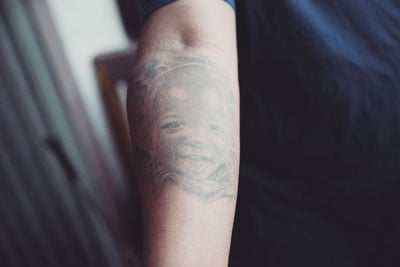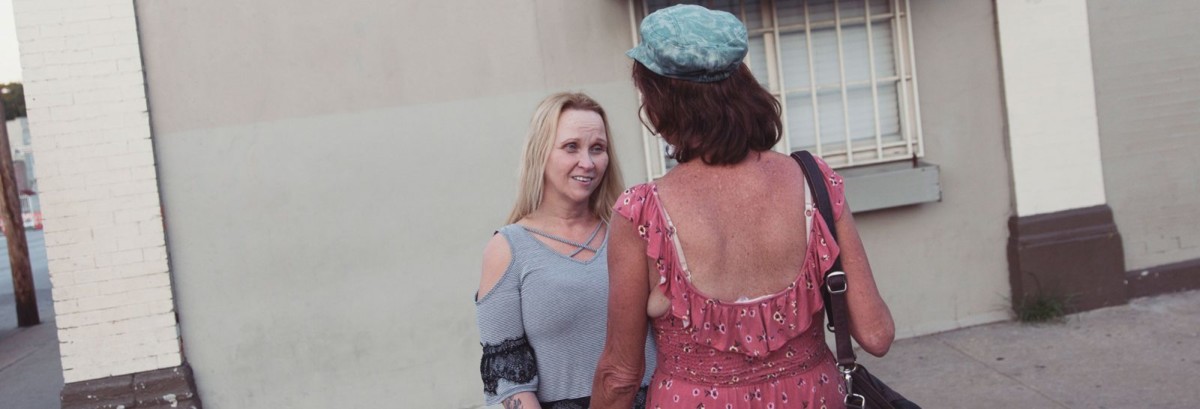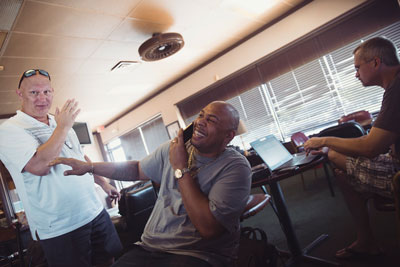
Johnny Waller was turned down for food stamps when he was essentially living at St. Jude Children’s Research Hospital in Memphis, Tennessee, as his two-year-old son Jordyn fought for his life against stage-four cancer in his stomach.
Given Jordyn’s fragile health, doctors told Johnny to prepare fresh food for him at the hospital. Money was tight since he had left his cleaning business back in Kansas City to care for his son. But that was temporary. Johnny just needed food stamps until he got back home and back to work.
Missouri state officials told Johnny not to bother even applying. He had a felony drug conviction, meaning he was banned for life from receiving food stamps, even though he was convicted at age 18.
It didn’t matter that Johnny had done his time – two-and-a-half years in prison – and left his old gang life far behind. It didn’t matter that he now ran a cleaning business that was creating jobs in his community. What mattered was he was an ex-felon carrying a conviction for drug possession. That meant he and his son were ineligible for food stamps.
Johnny didn’t need food stamps a few years later when criminal justice organizer Lora McDonald called asking for help repealing the lifetime ban. He was back at work, his son having lost his battle with cancer five days before his fourth birthday. Johnny still carried Jordyn with him wherever he went, his face etched in blue tattoo ink down his right forearm.
The two were together at Rockhurst University in Kansas City, where Johnny earned a 4.0 GPA while working full time as vice president of a nonprofit that helped ex-offenders transition from prison.

It’s rare that people like Johnny – people who have actually lived in poverty – shape the policies that shape their lives. They are left outside the halls of power – legislatures, city councils, mayors’ offices, governors’ mansions and the White House – where policies are made. And others, including their own advocates, work for them instead of with them.
So when Lora gave Johnny the opportunity to enter those halls – in this case the Missouri Statehouse – he seized it. And he told legislators why the food stamps ban didn’t make sense.
“Who knows it better than me? I’ve lived it,” Johnny said. “If I let it go, I am as wrong as everybody else.”
For Johnny, repealing the ban wasn’t only about food stamps. It was about everything he was told would be waiting to help him transition out of a Nebraska prison but simply wasn’t there.
“All these things they say you can do. No you can’t,” he said, recalling barriers he ran into because of his felony drug conviction. I “couldn’t get housing, couldn’t get a job.”
But a decade after his conviction, Johnny got the chance to remove one of those barriers when Lora listened to him.
Lora is executive director of the Kansas City chapter of Gamaliel, an organization that empowers ordinary people to drive political, environmental, social and economic decisions that affect their lives. The organization does this, in part, by listening. It doesn’t tell people what to say or why they should say it. Instead, it creates space where they can say it themselves.
It creates that space through training that helps people understand and identify what has oppressed them. Then they take calculated risks to confront symbols of that oppression – Johnny confronted the State Legislature – in structured ways. Gamaliel’s work is based on families owning, not simply telling, their stories.
“When you own your story, you have the courage to create something,” said Ana Garcia-Ashley, national executive director at Gamaliel, which has 44 affiliates in 16 states. “You are changing the hearts and minds by you having the courage to transform your own story.”
Gamaliel also connected Johnny to a broader movement of families across the country that was driving solutions to problems they faced every day. A big part of Gamaliel’s work is challenging the myths and misperceptions – often called the dominant narrative – that surround poor people, people of color, immigrants and youth. When policymakers are confronted with the reality of poverty, it is much harder for them to create policies based on myths.
When Lora McDonald took over as executive director of Gamaliel’s Kansas City affiliate, More2, she began gathering more stories like Johnny’s to challenge those myths. Together, families and Gamaliel’s leaders built a movement that fought to remove the food stamps ban as well as other barriers for low-income families, including lack of access to good jobs, reliable transportation, decent housing and healthy food.
Because it takes more than one story to dispel myths. It takes a movement.
“Who Has the Right to Label Me?”
It seemed like Christine McDonald had been written off much of her life. Then one day she sat in a Kansas City rehabilitation center and listened to a senior counselor pronounce her “unrehabilitatable.”
She had lost her eyesight in three days due to a rare disorder, after facing a terrible choice while pregnant. She could take medication for the disorder, but it posed a severe risk to her unborn child. She chose not to take the medication.

The center could place her in a sheltered workshop for people with disabilities, where she would earn $6 a day. And that was as good as it would get.
This was just the latest version of what she heard often during 21 years of living on the streets and in the public parks of Kansas City, Mo., where she struggled with addiction and was a victim of human trafficking. She was routinely pushed to the margins, told she didn’t matter.
But at the rehab center that day in 2006, she had been clean and out of jail for several years, learning how to be blind, and building a life for herself and her six-month-old son. She wanted to take the same steps as many other Americans: enroll in college; land a job that supports her family, and find a good place to live.
Christine needed food stamps to help feed her family temporarily, while she worked toward a degree and a new job. But like Johnny Waller, she was banned for life from the assistance because of felony drug convictions.
It seemed every time Christine tried to take a step forward toward her new life, she was written off: as an ex-felon, a recovering addict, disabled or “unrehabilitatable.” But really, she was poor and struggling in America, and that label more than any other made her invisible to people in power.
It turned out those labels were dead wrong. Within years of being told she was beyond rehabilitation, Christine earned a college degree, along with a high school diploma, was co-director of a nonprofit that fought human trafficking, and was raising her son as a single mother.
“Nobody has the right to sit on the other side, a person of authority, a person of power…to sit on the other side of the desk of somebody trying to get help and say they are not fixable,” said Christine. “Who has the right to label me?”
Over the next five years, Christine and Johnny together would begin changing the policies that had threatened to hold them back, including emerging as leaders in the successful fight to remove Missouri’s ban on food stamps for those with felony drug convictions.
It began one morning in 2008 when Christine sent a long email to the Kansas City Crime Commission, offering to help their work on prisoner re-entry. Since she had been arrested more than 100 times, she had plenty of experience. But, the executive who read her email instead saw a woman who needed help, and asked one of his program directors to see if she could.
That program director was Lora McDonald (no relation) who recognized that Christine was someone who could help them. Later that afternoon, she brought Christine to a press conference on prison re-entry.

“What we did was introduce her to the idea that she had the power to create change,” said Lora, who was a social worker before she became an organizer.
Then they turned to the food stamps ban.
Six Long Years
Every year for the next six years, Christine, Johnny and Lora traveled 150 miles to Missouri’s Capitol in Jefferson City, and explained to legislators the fundamental flaws of the ban – a vestige of the 1996 welfare reform act that many states had already jettisoned. Who understood those flaws better than them?
“If I would have been a murderer. If I had done a drive-by shooting or if I had robbed a bank I could have gotten food stamps, alright,” Christine said. “But, because I was an addict and dealt with the disease of addiction I was part of a lifetime ban, even though I had never had a violent arrest.”
Over and over again, Johnny and Christine explained how food stamps worked in the real world and why families need them.
Finally, at yet another hearing, they decided to share what they had accomplished in the six years the bill had been stalled in committee. Johnny first graduated from Johnson County Community College with honors, then graduated with honors from Rockhurst University after earning an academic scholarship. Christine was speaking around the country on human trafficking and had already published the first of her two books.
“And in six years you guys can’t manage to get this to the floor to a vote,” Lora told them. “It worked. I think that day was the day they voted it out of committee.”
There was another shift that day.
The “first time the bill made it out of committee to the House floor was when Johnny was treated like an expert,” Lora recalled. “They were the ones that flipped” legislators to vote yes.
In June, 2014, Missouri lifted its lifetime ban on residents with three or less felony drug convictions, though restrictions remained, according to The Kansas City Star.
Only the Beginning
Christine and Johnny belong to a growing movement of families who, having known poverty intimately, are now gaining access to the halls of the power. It’s the combination of their stories and expertise with Gamaliel’s model that is opening doors to those halls – and to change.
Today, Johnny is poised to graduate from business school with an MBA in December. Once again, he earned a 4.0 GPA. And he still works full time.
Since the food stamp ban was lifted, Johnny has worked on two successful campaigns to ban boxes on job applications that ask if an applicant has a felony conviction. He joined another that raised the age someone can be charged as an adult for many crimes to 18. Today, he is busier than ever.
“It’s led to actually me having the courage now to go out and (campaign) on other issues,” Johnny said.

These days, you often find Johnny in a cigar lounge and shop in a Kansas City suburb, organizing for another campaign, working or studying for his MBA.
“I am going to tell my story,” Johnny said, as he sat amid leather chairs, a walk-in humidor and hanging flat-screen televisions, apparently the only Black person in the lounge. “However long it takes. We are in it for the long haul.”
Meanwhile, Christine has moved on to other pieces of legislation, and is active in many arenas. Today, for example, she sits on multiple state boards, including the Missouri Attorney General’s Human Trafficking Task Force, and a state advisory council on behavioral health and substance abuse disorders. She also is director of advocacy at Restoration House of Greater Kansas City, a long-term residential program for victims of trafficking, and a respected author and speaker on social justice issues.
When Christine first joined the debate over food stamps, “I didn’t think people like me had that kind of power.” But, every time she testified before Missouri legislative committees she gained confidence.
Now, she hopes to run for political office in the future.
“We all have the ability to change the world, and us,” she said.
This story was produced by the Marguerite Casey Foundation’s Equal Voice News, a digital storytelling platform.
Press freedom is under attack
As Trump cracks down on political speech, independent media is increasingly necessary.
Truthout produces reporting you won’t see in the mainstream: journalism from the frontlines of global conflict, interviews with grassroots movement leaders, high-quality legal analysis and more.
Our work is possible thanks to reader support. Help Truthout catalyze change and social justice — make a tax-deductible monthly or one-time donation today.